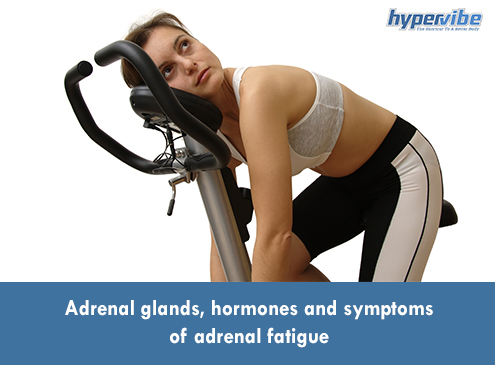
The adrenal or suprarenal glands are located on top of each kidney, being small endocrine glands that release hormones into the bloodstream. Among the substances secreted by these structures are cortisol, aldosterone, testosterone, adrenaline and noradrenaline.
Although very small in size and weighing only 4-5 g in an adult, the adrenals play an important role in your overall health, their main role being to help the body deal with the stress caused by everyday life. The hormones produced by the adrenals regulate the responses of your organism to changes in the internal and external environment, so when these glands don’t work properly, the body’s ability to adapt to stress is also affected.
The substances produced by the suprarenal glands are involved in regulating numerous processes, from the metabolism of carbohydrates, proteins and fats, to the distribution of the stored fat cells, the regulation of blood sugar levels and of the cardiovascular and gastrointestinal functions, the immune function and the body’s response to allergens and harmful agents.
When you’re in a threatening or dangerous situation, it’s the hormones produced by the adrenal glands that trigger the fight-or-flight response and mobilize your body’s resources to help you manage that situation. Also, when exposed to pathogens that cause symptoms like inflammation, infection and swelling, it’s the protective – anti-inflammatory and anti-oxidant – activity of the hormones secreted by the suprarenal glands that enables your body to fight the pathogens.
The adrenal glands are made of two distinct parts: the outer part is called the adrenal cortex, and produces the cortisol, adrogens and aldosterone hormones, while the inner part is called medulla and is responsible for secreting the adrenaline and noradrenaline hormones.
Aldosterone is a mineralocorticoid, and helps your body maintain its salt and water levels, being involved in regulating the blood pressure. Without this hormone, your body would lose excessive amounts of salt and suffer from severe dehydration.
Cortisol, also called the stress hormone, regulates the metabolism and has anti-inflammatory effects. It stimulates glucose production and is involved in regulating the cardiovascular function and blood pressure. Cortisol is a glucocorticoid.
The adrenal androgens include testosterone and DHEA, which play a role in the development of the male sex organs and are also produced in women during puberty. However, it’s worth mentioning that the amount of sex hormones produced by the adrenals is much smaller than the amount produced by the ovaries or testicles.
The hormones secreted by the medulla are called catecholamines. Although they aren’t vital, meaning that you can survive without these substances, they’re still very important for your body. Adrenaline or epinephrine is the hormone that causes your heart to beat faster and increases the blood flow to muscles and brain in stressful situations.
It also causes spikes in blood sugar level by helping the body convert the glycogen stored in the liver to glucose. As for noradrenaline works together with adrenaline when you face stressful situations and it’s the substance responsible for the narrowing of blood vessels and the increase in blood pressure when you’re in danger.
When the adrenal glands are working poorly due to prolonged mental, physical or emotional stress, the so-called adrenal fatigue can occur. Although it’s not considered a condition or ailment, adrenal fatigue is thought to cause symptoms like chronic tiredness, trouble sleeping and thinking clearly, nervousness, body aches and digestive issues.
On the other hand, when these glands don’t produce enough hormones, the term used for defining the issue is adrenal insufficiency or Addison’s disease. In this situation, symptoms like low blood pressure, fatigue, unexplained weight loss, body aches, loss of body hair, lightheadedness and skin discoloration may occur. Also common in adrenal insufficiency are nausea, abdominal pain and vomiting, cravings for salty foods, and in women, the loss of secondary sex characteristics.
If your adrenals aren’t functioning normally, the metabolism of carbs can be affected, and this can result in altered blood sugar levels and energy production. Cortisol is involved in maintaining normal levels of blood glucose, and when this hormone isn’t produced in the right amounts, the risk of developing metabolic syndrome or type 2 diabetes increases.
Another condition that may result from an altered production of adrenal hormones, but this time from excessive secretion of cortisol, is Cushing’s syndrome. When the overactive suprarenal glands produce too much cortisol, symptoms like high blood pressure, excessive facial hair, irregular periods, bruising and thinning of skin, weight gain and muscle weakness can occur.
Osteoporosis is also likely to develop in people with this syndrome, other potential consequences including an increased risk for diabetes and psychiatric disturbances, increased susceptibility to infections and slow-healing wounds. In kids, Cushing’s syndrome can cause growth problems.
If the suprarenal glands produce too much androgens, which is rare, this can lead to excessive hair growth and altered menstrual periods. If the glands release too much aldosterone, one may experience increased blood pressure, headaches and eye problems.
Have something to add to this article? Comment below or join our Facebook community and share your thoughts with us!

Updated on: 08.09.2021 The lymphatic system is involved not only...

Stress can make you gain weight – we’ve heard this...

Various theories exist to answer this question. As you will...

Our series of whole body vibration machine exercise articles continues...

Both rebounding and jumping on a trampoline are excellent ways...